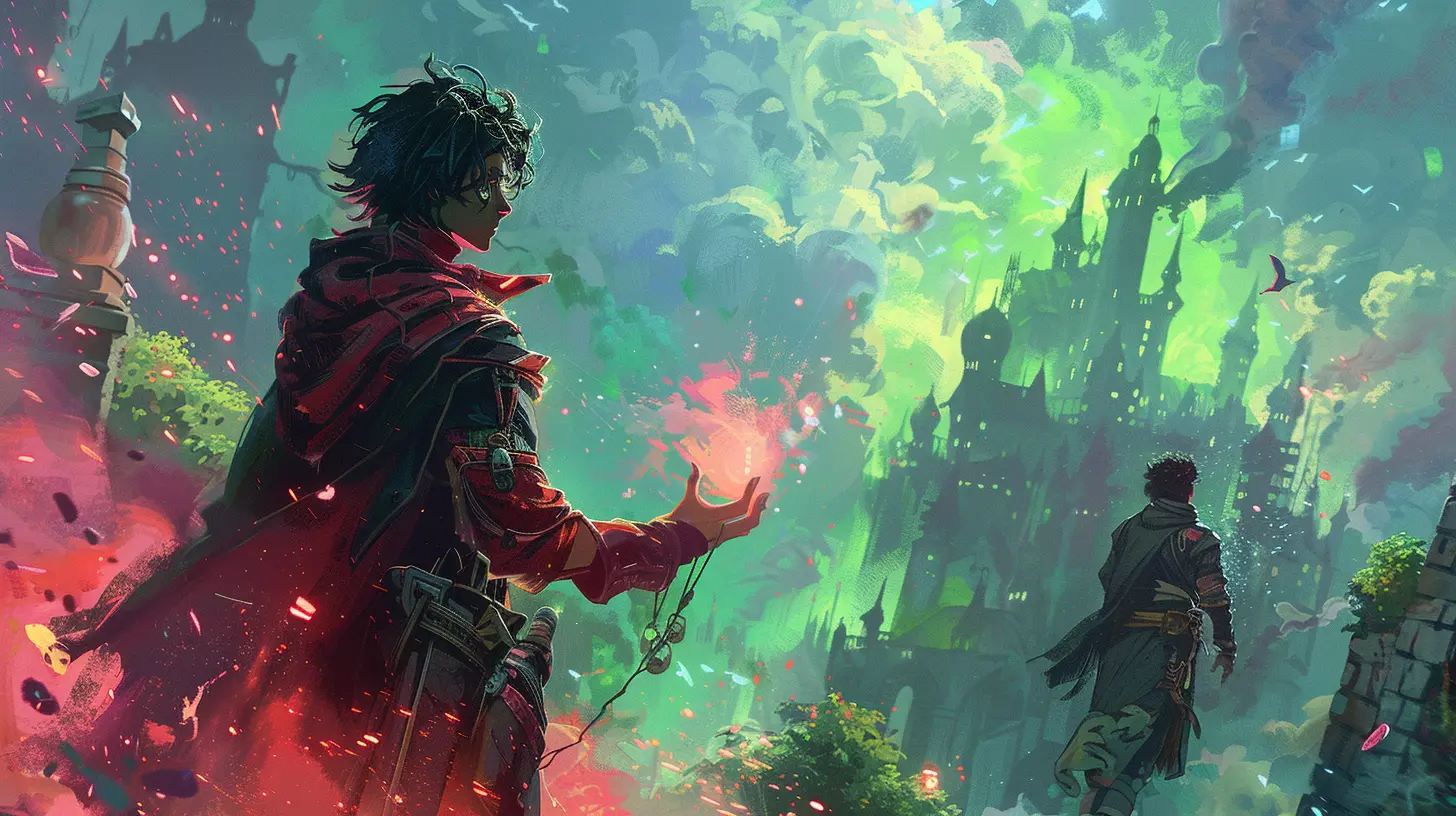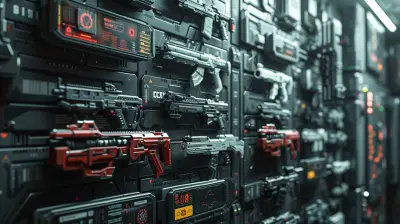The Value of Backer Feedback in Kickstarter Game Development
6 June 2025
Let's face it — developing a game isn't a walk in the park. It's more like juggling flaming swords on a unicycle...with a blindfold. Now, toss the word “Kickstarter” into that mix, and you've got yourself a full-on circus act.
But what if I told you there’s a not-so-secret weapon game devs can use to tame that wild Kickstarter beast? (Cue dramatic drumroll…)
It’s backer feedback. Yep, those folks tossing their hard-earned cash your way aren’t just there to make your dreams come true; they’re also the peanut gallery you should be listening to. They’ve got opinions, ideas, and sometimes brutally honest feedback that can turn your passion project from “meh” to “must-play.”
Let’s dive headfirst into why backer feedback is so dang important in Kickstarter game development — and how you, as a developer or curious gamer, can get in on the action.
What Is Kickstarter Game Development Anyway?
Alright, if you’ve been living under a digital rock (no judgment), let’s break it down real quick.Kickstarter is a crowdfunding platform where gamers with a dream (and hopefully a prototype) ask the community to help fund development costs. In return, they promise sweet rewards — exclusive content, early access, maybe even a custom character lovingly named after your cat.
Unlike traditional publishing models, Kickstarter allows developers to keep creative control. But...they also inherit the responsibility of keeping everyone who pledged money in the loop.
Spoiler alert: this is where backer feedback comes swooping in like Batman with a controller.
Why Backer Feedback Is the Secret Sauce
Imagine cooking a massive pot of spaghetti without tasting it. You’re just tossing ingredients in, hoping it's not a total flavor disaster.Backer feedback is the taste test.
These are the folks who’ve bought into your vision—literally. They’re emotionally (and financially) invested in your game. They want it to succeed just as much as you do, which makes their input an absolute goldmine of perspective.
1. Early Warnings = Disaster Averted
Backers are remarkably good at spotting red flags. Seriously, they’ve seen all kinds of Kickstarter fumbles — missed deadlines, broken promises, pixel art disasters, the whole nine yards.When you involve backers early, they’ll tell you things like:
- “Hey, that combat system feels janky.”
- “Why is the cat NPC more interesting than the main character?”
- “Dude, your stretch goals are INSANE. Scale it back.”
And let’s be real… hearing this from the backers is way better than reading it in angry Metacritic reviews later on.
2. Fresh Eyes Catch the Weird Stuff
You know when you've been staring at something for so long that you literally can’t see the glaring issues anymore? Same goes for game development.Backers approach your game with fresh eyes. They’ll pick up on stuff you’ve glossed over a hundred times — unbalanced mechanics, typo-riddled item descriptions, or that one oddly shaped tree that looks suspiciously like a butt (you know it’s true).
3. A Litmus Test for Demand
Thinking of adding a survival mode? How about making the game co-op? Before you blow half your budget building a whole new feature, ask your backers.They’ll tell you whether it’s a genius idea or a one-way ticket to “feature creep” city.
Some of the best decisions come straight from backer polls, discussion threads, and playtest feedback. It’s like having your own personal focus group—only they actually care.
Ways Developers Can Collect Backer Feedback
OK, so backer feedback is important. But how do you actually collect it (without going full stalker mode)?1. Kickstarter Comments and Updates
Here’s a wild idea — use Kickstarter itself. You’d be surprised how many devs post updates and then promptly ghost their comment section. C’mon, people.Read the comments, ask questions, and engage with backers like they’re humans (because they ARE).
2. Surveys & Polls
Grab a survey tool (like Google Forms or SurveyMonkey) and start asking questions. Not the boring “rate us 1-10” kind, but actual thoughtful stuff like:- Which boss fight was most memorable?
- Did you rage-quit the tutorial? Be honest.
- Would you prefer lootboxes or crafting? (Trick question: neither.)
3. Beta Access & Playtesting
You want the real feedback? Ship out early versions of the game and let backers tear it apart — lovingly, of course.Beta access is like giving your inner circle the keys to your kingdom. They’ll test things you didn’t even know needed testing. Just make sure you’ve got thick skin and lots of coffee.
4. Community Platforms (Discord, Reddit, etc.)
Set up a Discord server, start a subreddit, or join existing forums where your backers hang out. These digital campfires are where the best ideas are roasted… and sometimes marshmallow debates happen too.When communication flows both ways, the community feels heard — and you get better feedback.
How Backer Feedback Has Saved (and Elevated) Real Games
Let’s talk receipts. Some pretty amazing indie games were shaped and reshaped thanks to backer feedback. And no, this isn’t one of those vague “an anonymous dev once said” situations. These are real wins.Example 1: Hollow Knight’s Radiant Mode
OK, technically not a Kickstarter project, but Team Cherry took community engagement to a whole new level. Radiant Mode (a super hardcore difficulty) was added after fans kept asking for an even more brutal challenge. The devs listened, delivered, and basked in the glorious “Git Gud” culture of their fans.Example 2: Divinity: Original Sin II
This gem raised over $2 million on Kickstarter and involved backers all the way. Larian Studios used backer playtests, polls, and community discussions to refine game mechanics and even story elements. The result? A critically-acclaimed RPG hailed as one of the best in recent memory.Example 3: Darkest Dungeon
Remember when death in games was just a slap on the wrist? Not in Darkest Dungeon. But backers said, “Whoa, slow down, buddy. Let us breathe.” Red Hook Studios adjusted the game’s punishing difficulty curve based on early feedback, striking a better balance between challenge and sanity.The Risk of Ignoring Backers (Don’t Be That Dev)
We love a good success story, but let’s be real — Kickstarter is also littered with cautionary tales.Some developers think they know better. They treat backer feedback as background noise, only to discover the hard way that ignoring your community is like inviting a horde of angry bees into your living room.
Trust me, you do NOT want to be the dev trending on social media for broken promises and radio silence.
The TL;DR? Respect the people funding your dream. They’re not just wallets with opinions—they’re collaborators.
Tips for Handling Feedback Without Losing Your Mind
Let’s be honest—feedback isn’t always sunshine and rainbow-colored loot crates. Sometimes it's harsh. Occasionally, it’s downright savage.Here’s how to survive:
1. Don’t Take It Personally
It’s your baby, I know. But if someone says your game's interface looks like it was designed by an over-caffeinated raccoon, take a breath. Step back. Improve it. Raccoons don’t write code (yet).2. Look for Patterns
One random complaint? Maybe a fluke. Fifty people saying your inventory system sucks? That’s a trend you can’t ignore.Use backer feedback to spot recurring issues and prioritize fixes.
3. Say “Thank You”
Whether the feedback is glowing or grumpy, say thanks. A little gratitude goes a long way, and it keeps backers engaged and willing to help again.The Long-Term Benefits of Backer Feedback
Let’s zoom out for a sec. Backer feedback isn’t just useful during development — it has ripple effects long after your Kickstarter ends.- 😎 Loyal fans become long-term advocates.
- 🎮 Better games mean better post-launch reviews.
- 💰 Your next campaign (yes, there’s always a next) gets easier.
In the end, engaging with backers isn’t about appeasing the crowd or chasing trends. It’s about building a game that’s worth playing — with the people who helped make it happen.
Final Thoughts — Listen Like a Pro
Kickstarter game development is messy, exhilarating, and sometimes chaotic. But through it all, one universal truth remains: backer feedback is one of your greatest assets.It’s like having a co-pilot who’s been to every turbulence-heavy launch before you — and knows exactly when to shout, “PULL UP!” before you crash into a mountain of bad decisions.
So, developers: next time your inbox fills with backer comments, don’t groan. Read them. Respond. Reflect.
And gamers: keep sending those messages, filling out those surveys, and playtesting with passion — you’re part of something amazing.
Now go make (or fund) something great.
all images in this post were generated using AI tools
Category:
Kickstarter GamesAuthor:

Emery Larsen
Discussion
rate this article
3 comments
Lark Simon
Backer feedback in Kickstarter game development transcends mere suggestions; it embodies a collaborative spirit that can reshape a game’s identity. By valuing this input, developers not only enhance gameplay but also foster a community that feels invested, transforming players into co-creators of their artistic vision.
June 15, 2025 at 3:24 PM

Emery Larsen
Thank you for your insightful comment! I completely agree that backer feedback is crucial in shaping game identity and fostering a collaborative community. It truly empowers players and enriches the development process.
Dylan McAlister
Engaging backers fosters innovation and improves game quality; their insights are invaluable!
June 9, 2025 at 3:04 PM

Emery Larsen
Thank you! Engaging with backers truly enhances the development process and leads to better games. Their perspectives are essential!
Dominique Dorsey
Thank you for highlighting the importance of backer feedback! It truly shapes the creativity and direction of game development. Great insights!
June 7, 2025 at 4:41 AM

Emery Larsen
Thank you for your kind words! Backer feedback is indeed invaluable in shaping our creative journey.



